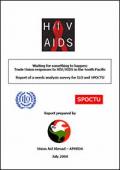Publications - Released in 2004
Unions in South Pacific countries face many threats and in many instances have weak or fragile capacities and infrastructures. Programs that respond to the needs of members and non-union workers in relation to HIV and sexual health can assist in building unions as effective civil society (or “non-state”) actors.
Discrimination does not appear to be a major problem in most countries and has been resisted by unions when it has occurred. As cases grow, union policies will need to be in place to counter discrimination that will inevitably occur due to fear and ignorance. Issues of voluntary testing and confidentiality have not been widely debated or considered in most countries. Union leaders and their members need to be well informed and convinced of these key issues in order to protect the rights of workers and to counter demands for involuntary testing and keeping HIV status confidential.
Apart from Australia, New Zealand, and French territories, other South Pacific unions have yet to develop plans of actions to deal with HIV/AIDS. Unions require assistance to develop workplace policies and education programs in line with the ILO Code of Practice.






